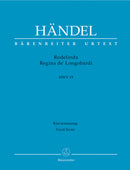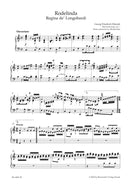| 作曲者 | George Frideric Handel (1685-1759)・ジョージ・フリデリック・ヘンデル |
| タイトル | Rodelinda, Regina de' Longobardi HWV 19 -Dramma per musica in thre acts- (ヴォーカル・スコア) |
| サブタイトル | Dramma per musica in 3 acts |
| 出版社 | Bärenreiter・ベーレンライター |
| シリーズ名 | BÄRENREITER URTEXT |
| 楽器編成 | Soloists, Orchestra |
| 楽器編成(詳細) | SSolo/MezSolo/2ASolo/TSolo/BSolo/Orch |
| 品番 | 9790006505395 |
| 校訂者 | Andrew V. Jones |
| 編曲者 | Michael Rot |
| 言語 | ドイツ語、イタリア語 |
| 形状 | XI, 303 ページ・27.0 x 19.0 cm・854 g・ソフトカバー |
| 出版年 | 2017年第5刷 |
| 出版番号 | BA 4064-90 |
| ISMN | 979-0006505395 |
After Giulio Cesare and Tamerlano, Rodelinda is the third masterly opera that Handel composed between December 1723 and January 1725. The words were written by Nicola Haym, the author of many other Handel librettos. The first performance took place at the King's Theatre in the Haymarket, London, on 13 February 1725. Rodelinda thrives entirely on the ethical supremacy of conjugal love, and thus prefigures the great operas by Gluck and Beethoven on the same subject. The plot is taken from the history of the Lombard royalty.
Oskar Hagen's revival of Rodelinda in 1920 ushered in the modern Handel opera movement.
The work forms the climax to a series of dramatic masterpieces that includes Handel's most significant operas.
Handel returned to Rodelinda on two occasions, in December 1725 and in May 1731. Many far-reaching changes were necessary owing to the different skills of the new singers.
For example, Handel wrote three new arias and a duet for the first revival. Yet the changes he made for this performance, doubtless to accommodate the needs and wishes of the singers, also improve the work's dramatic substance.
Our vocal score is based on the Urtext of the full score published in the Halle Handel Edition (II/16) and reproduces the various alternative readings and versions in an appendix.





